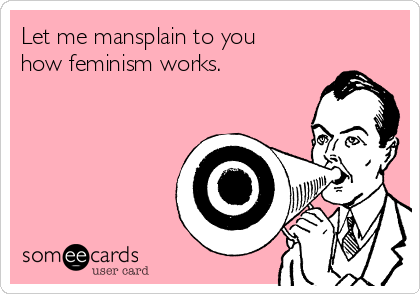Men Explain Things To Me

Whenever I have mentioned feminism in my regular conversations, it has always produced some interesting reactions, ranging from shocked confusion and disapproval to uncomfortable giggling and topic changes.
Last friday night was no different. At a distant cousin’s wedding, the conversation at our table came to a dramatic halt when I mentioned Fem Magazine and feminism. To my surprise, nobody called me blasphemous or accused me of man-hating, which is almost miraculous considering my tightly wound Middle Eastern family categorizes feminism as science fiction: alien and otherworldly. What ensued, though, was even worse.
At first, a few of the men at the table nodded their heads in what seemed to be approval; one of them even muttered, “I can get with that.” I was naively pleased, until this so-called “getting with that” turned out to be something quite different: the cis men at the table started to tell me what feminism was or wasn’t, and hence, why we did or didn’t need it.
Some noteworthy remarks were, “Feminism isn’t even about equality because you’re actually more than equal; you get into clubs a lot easier and get out of tickets a lot faster”; “Feminism is grasping at straws. I get that shaving everyday might be annoying, but like once a week isn’t that bad. How hairy are you anyway?”; and my all time favorite, “Feminism is actually bringing girls down: guys won’t pick up the tab anymore and nobody will compliment them or open doors ‘cause we’re all scared of getting yelled at. So who’s really losing here?”
This might be typical cis male rhetoric in response to feminism, and my shock might have resulted from the fact that I’ve been too snuggled up in my cozy world of Fem and tumblr to actually notice that feminism is still “extreme” in the real world. However, what scared me the most wasn’t their disapproval; I couldn’t care less. It was their deliberate and direct act of defining feminism for me, a cis female. They weren’t saying what feminism should be, but what it is.
And then I realized that I have been subjected to this condescension my entire life. As long as I can remember, I’ve had men explain things to me on matters that I am more than knowledgeable about.
After attending guitar lessons for seven years, a male classmate proceeded to “school” me on the correct way to read notes (something I learned during the first month of classes). As the director of my Community College newsletter team, I was subjected to “lessons” from my male interns (the students I supervised) on how to properly format the layouts. As the only self-identifying female in my CC computer development class, I was “taught” by the rest of the male class the abstraction practices and the correct way to pronounce data (!), despite the fact that I had taken the exact same prerequisites as they had and was actually doing quite well in the class.
I have recently discovered that this repeated pattern is so commonplace that it actually has a name of its own – mansplanation. The term refers to the condescendingly delivered responses (or “splanations”) of a man, who despite not knowing enough (or sometimes even anything) on a subject, insists on explicating it nonetheless. It is so common, in fact, that Rebecca Solnit’s initial article on the issue in The Los Angeles Times is now a full-fledged book, 130 pages.
I personally dislike such combo terms as “mansplanation,” not only because I am an obsessive English major, but also because they seem to infantilize or trivialize the serious agenda of feminism. Nevertheless, I believe this notion of “mansplanation,” or whatever other term you would like to use, is deeply rooted in patriarchy.
Think of the thousands times you were told what a muffler was at the repair shop despite having a very decent understanding of cars. Think of the numerous times you were told how to do things, especially in male-dominated fields like math, technology, and science, despite having more than enough knowledge and qualifications.
Think of the numerous times that you were (and still are) taught what feminism is or isn’t by individuals who are either not directly involved in the cause or (even worse) benefit from its destabilization.
So cis males, listen up!
Whether or not you think you know more than your fellow female relatives, co-workers, classmates, etc., it is not your right to give your opinions as facts.
Pay attention to the female voices around you, and understand that their experiences and beliefs have equal weight to yours, and their knowledge and abilities are of an equal footing. And in the case of feminism, they carry much more weight.




